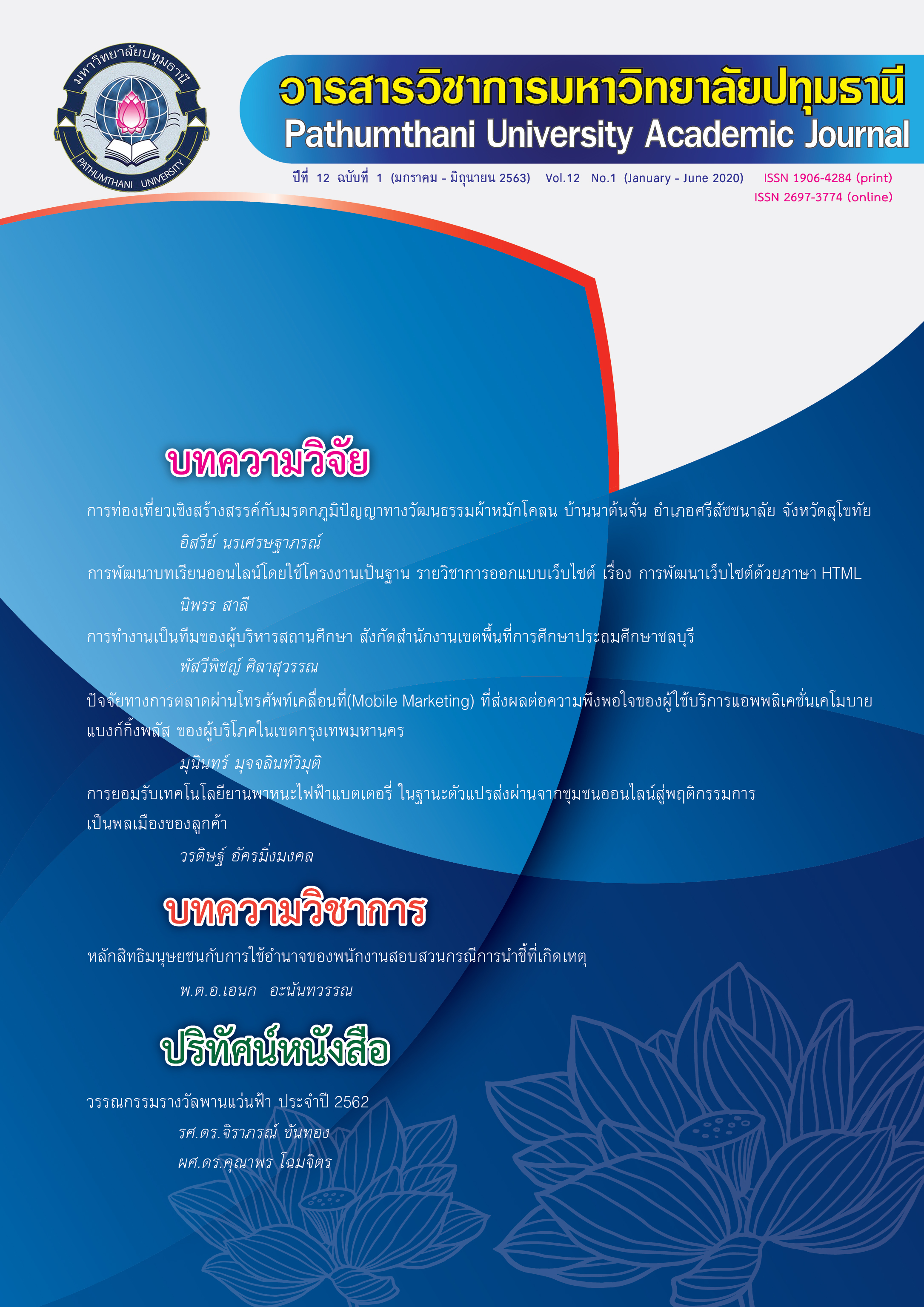THE RELATIONSHIP OF CONSUMERS’ PERCEPTION, ATTITUDE AND PURCHASING DECISION PROCESS FOR ECO-FASHION OF CONSUMER IN BANGKOK
Keywords:
Perception, Attitude, Purchasing Decision Process, Eco-Fashion productAbstract
The objective of this research was 1) to study the relationship between consumers’ perception and attitude toward Eco-Fashion 2) to study the relationship between consumers’ perception and purchasing decision process toward Eco-Fashion 3) to study the relationship between attitude and purchasing decision process toward Eco-Fashion. The samples group used in this research was 400 consumers in Bangkok, who had purchased Eco-Fashion product, by using the questionnaires, the data was analyzed by using frequency, percentage, mean and standard deviation. Hypothesis was analyzed by Pearson’s Correlation Coefficient at the .01 level of significance. The research results revealed that the majorities were females between the ages of 31–40 years old, Bachelor’s degree, private employee and the most purchased is clothes. The samples had high level of overall perception, the overall attitude was good and high level of overall purchasing decision process. Hypothesis test results found that 1) all consumers’ perception and attitude toward Eco-Fashion was in moderate. 2) Consumers’ perception and purchasing decision process toward Eco-Fashion was moderate. 3) Attitude and purchasing decision process toward Eco-Fashion was moderate.
References
กรณิศ ตันอังสนากุล. (2560). [ออนไลน์]. การบริโภคและการผลิตอย่างยั่งยืน ภารกิจกู้โลก เข้าถึงได้จาก www.progreencenter.org/2017/01/18/scp1/ เมื่อวันที่ 18 ตุลาคม 2561.
กัลยา วานิชย์บัญชา. (2561). สถิติสำหรับงานวิจัย. (พิมพ์ครั้งที่ 12). กรุงเทพมหานคร : สำนักพิมพ์แห่งจุฬาลงกรณ์มหาวิทยาลัย.
กำพล ลิขิตกาญจนกุล. (2561). [ออนไลน์]. เบื้องหลังความสวยหรูของแฟชั่น คืออุตสาหกรรมสกปรกที่ทำลายล้างโลก. เข้าถึงได้จาก www.vogue.co.th/the-true-cost-of-Fashion. เมื่อวันที่ 18 ตุลาคม 2561.
ฉัตยาพร เสมอใจ. (2556). พฤติกรรมผู้บริโภค. กรุงเทพมหานคร : สำนักพิมพ์ซีเอ็ดยูเคชั่น.
ณัชชา บางท่าไม้ และคณะ. (2552). “ทัศนคติและพฤติกรรมการใช้สินค้าที่เป็นมิตรต่อสิ่งแวดล้อมของนิสิตนักศึกษาปริญญาตรีในเขตกรุงเทพมหานคร.” วารสารจุฬาลงกรณ์ธุรกิจปริทัศน์. ปีที่ 31 (119-120) : 56-71.
ปริญญากร หาญวุฒิสุทธิ์. (2556). ความเกี่ยวพันต่อสิ่งแวดล้อม ทัศนคติ และการตัดสินใจซื้อผลิตภัณฑ์เพื่อสิ่งแวดล้อมของผู้บริโภค. วิทยานิพนธ์ปริญญานิเทศศาสตรมหาบัณฑิต. สาขาวิชานิเทศศาสตร์. จุฬาลงกรณ์มหาวิทยาลัย.
ปรีชาพล ชูศรี. (2553). การรับรู้และทัศนคติต่อสินค้าที่มีฉลากคาร์บอนฟุตพริ้นท์ของประชาชน. วิทยานิพนธ์ปริญญาเศรษฐศาสตรมหาบัณฑิต สาขาวิชาเศรษฐศาสตร์ธุรกิจ. มหาวิทยาลัยธรรมศาสตร์.
ภัทราพร แย้มละออ. (2561). [ออนไลน์]. แฟชั่นที่ดีต้องยืนยาวและไม่เอาเปรียบโลก – ปรัชญาแฟชั่นยั่งยืน แบบ Eileen Fisher. เข้าถึงได้จาก www.thestandard.co/eileen-fisher/. เมื่อวันที่ 18 ตุลาคม 2561
ราช ศิริวัฒน์. (2560). [ออนไลน์] ทฤษฎีเกี่ยวกับการตัดสินใจซื้อ. เข้าถึงได้จาก https://doctemple.wordpress.com/2017/01/25/ทฤษฎีเกี่ยวกับการตัดสิน/. เมื่อวันที่ 25 มกราคม 2560
วีรภัทร วัสสระ. (2558). การศึกษาการรับรู้ของผู้บริโภคและปัจจัยที่มีผลต่อการตัดสินใจซื้อสินค้าอุปโภคบริโภคที่ออกแบบเพื่อสิ่งแวดล้อม. การค้นคว้าอิสระปริญญาบริหารธุรกิจมหาบัณฑิต. มหาวิทยาลัยธรรมศาสตร์.
สมรัฐ บุรีรัตน์. (2552). ทัศนคติของผู้บริโภควัยรุ่นต่อผลิตภัณฑ์เพื่อสิ่งแวดล้อมในกรุงเทพมหานคร. การค้นคว้าอิสระปริญญาบริหารธุรกิจมหาบัณฑิต. มหาวิทยาลัยเชียงใหม่.
สุภาวดี ขุนทองจันทร์. (2560). การวิจัยธุรกิจ. กรุงเทพมหานคร : สำนักพิมพ์ซีเอ็ดยูเคชั่น
Andrew McCaskill. (2015). [online]. Consumer-Goods’ Brands that demonstrate commitment to sustainability outperform those that don’t. Available from : www.nielsen.com/eu/en/press-room/2015/consumer-goods- brands-that-demonstrate-commitment-to-sustainability-outperform.html, on 19 October 2018.
Hewa Ghafor Hassan. (2018). “The impact of social media on consumer behavior during product purchase decision making process.” EPH – International Journal of Business & Management Science. Vol.4, Issue 3.
Kotler, P. and K. L. Keller. (2016). Marketing Management. (15th ed). Pearson Education, Inc.
Kumar, D.Suresh and Rajesh Sharma. (2015). “A study of consumer’s perception and attitude towards green products.” International Journal of Advanced Research in Management and Social Sciences. Vol. 4 No. 8:
-297.
Melisha Pather. (2014). Factors affecting the consumer decision-making process in Affrica. Master of Business Administration. Gordon Institute of Business Science, University of Pretoria.
Morel, Magali and Francis Kwakye. (2012). [online]. Green marketing: Consumers’ Attitude towards eco-friendly products and purchase intention in the fast-moving consumer goods (FMCG) sector. Available from :
www.divaportal.org/smash/get/diva2:553342/fulltext01. On 21 December 2018
Muntaha Anvar and Marike Venter. (2014). “Attitudes and purchase behavior of green products among generation Y consumers in South Africa.” Mediterranean Journal of Social Sciences. Vol. 5, No. 21: 183-194.
Schiffman, G. L. and L. L. Kanuk. (2010). Consumer Behavior. (10th ed). Pearson Education, Inc.
Subooh Yusurf and Zeenat Fatima. (2015). “Consumer attitude and perception towards green products.” The International Journal of Indian Psychology. Vol.2, Issue 3: 140-146.
United Nations Global Compact. (2018). [online]. Eco Fashion รสนิยมของคนรักษ์โลก. Available from : http://globalcompact-th.com/unite-bulletin/detail/21, on 18 October 2018.
World Resources Institute. (2017). [online]. The apparel industry’s environmental impact in 6 graphics. Available form : www.wri.org/blog/2017/07/apparel-industrys-environmental-impact-6- graphics. On 19 October 2018.
Zul Ariff Abdul Latiff et al. (2018). “Consumer decision-making process in purchasing packaging products in Malaysia.” Canadian Social Science. Vol. 14, No. 7: 23-27
Downloads
Published
How to Cite
Issue
Section
License
บทความที่ได้รับการตีพิมพ์เป็นลิขสิทธิ์ของวารสารมหาวิทยาลัยปทุมธานี
ข้อความที่ปรากฎในบทความแต่ละเรื่อง เป็นความคิดเห็นส่วนตัวของผู้เขียน กองบรรณาธิการไม่จำเป็นต้องเห็นด้วยเสมอไป และไม่มีส่วนรับผิดชอบใด ๆ ถือเป็นความรับผิดชอบของผู้เขียนแต่เพียงผู้เดียว



